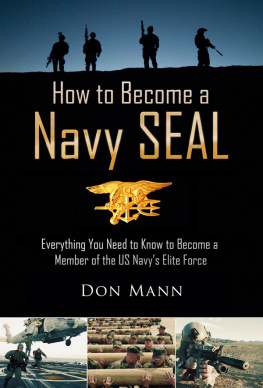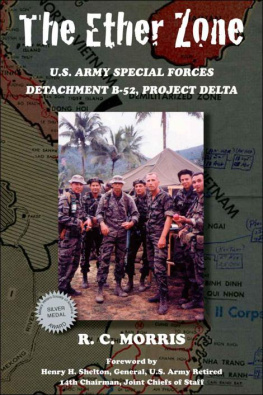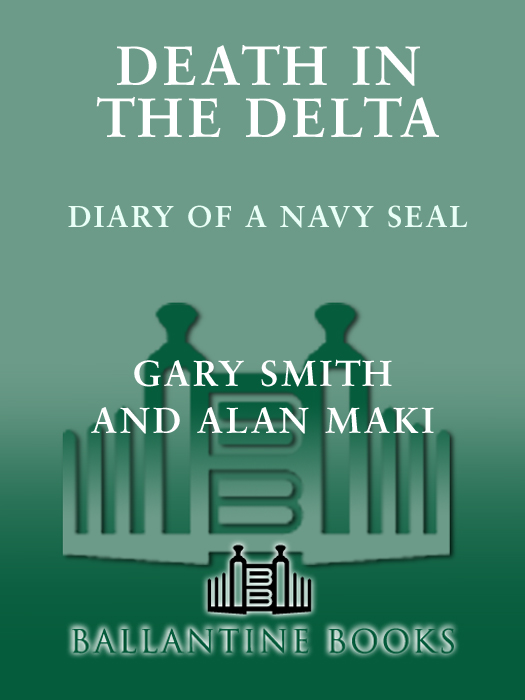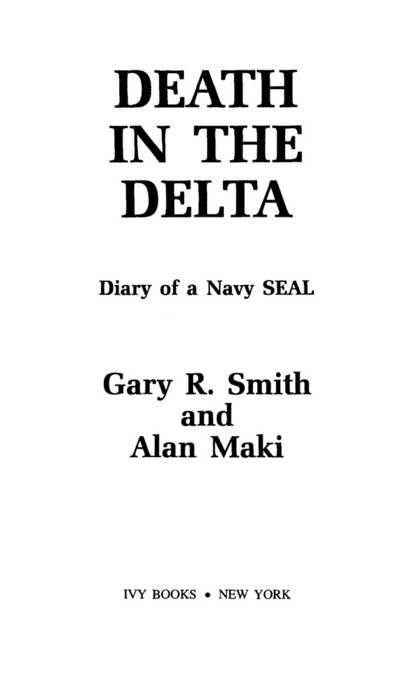As the men continued their cackling and drinking, I couldnt help but take a good, long look at each of them. They were all fine, strong men, I thought. Sure, they were a bit rowdy and coarse, but the heat, the harsh living conditions, and the hell of a swamp war were not conducive to the milksop and the mollycoddle. War was, in fact, a bitch, and these men did not refrain from calling it a bitch and treating it as such. And neither did I as I mentally prepared to depart from my friends the next day. I knew I would soon be stepping smack in the middle of the shit hitting the fan, once again meeting the enemy right on his front doorstep.
With these thoughts, I suddenly raised a can of beer and bellowed, If I die at Nam Canh, men, put this verse on my tombstone: And when he goes to Heaven, to Saint Peter he will tell: Another Navy SEAL reporting, sir; Ive spent my time in hell!
Hoo-yah! a couple of men chorused, then we all drank the night away.
By Gary R. Smith
Published by Ivy Books:
DEATH IN THE JUNGLE: Diary of a Navy SEAL
(with Alan Maki)
DEATH IN THE DELTA: Diary of a Navy SEAL
(with Alan Maki)
MASTER CHIEF: Diary of a Navy SEAL
An Ivy Book
Published by The Ballantine Publishing Group
Copyright 1996 by Gary R. Smith and Alan Maki
All rights reserved under International and Pan-American Copyright Conventions. Published in the United States by The Ballantine Publishing Group, a division of Random House, Inc., New York, and simultaneously in Canada by Random House of Canada Limited, Toronto.
http://www.randomhouse.com
Library of Congress Catalog Card Number: 95-95306
eISBN: 978-0-307-78849-8
v3.1
Contents
ACKNOWLEDGMENTS
The authors wish to thank their families for their support and encouragement; Owen Lock, Editor, Ivy Books; and Ethan Ellenberg, Literary Agent, for their patience.
For my UDT/SEAL/EOD teammates I offer my thanks to Alan Todd and John Odusch for their introductions. I especially appreciate Alan Todds detailed recollections of Hotel Platoons Brightlight mission, platoon roster and photo, and roster of their MST/BSU personnel; and John Oduschs recollections on the Aqua Dart. A special thanks goes to Lou DiCroce for X-Ray platoons total KIA and WIA list. I am very grateful to Al Betters (curator for the West Coast UDT/SEAL Museum in Redwood, CA), Mike Rush, and Paul Lee Pittman for their timely assistance in locating the rare Echo, Foxtrot, and Golf Platoon rosters and pictures for this book. Lastly, I thank Doc Holmes for giving me the names of UDT-11s Golf Platoon and their SEAL Float detachment picture.
Certainly not least, I wish to thank Alan Maki for editing a good portion of this book for me and Dennis Cummings for his historical assistance and insights.
And most of all, a special thanks and salute to all of Garys UDT/SEAL/EOD mates, those still alive and those who have passed over the bar.
Introduction
The room was very formal and carefully arranged to be as intimidating as possible. There was a series of windows which overlooked the railroad yard that led into the old Studebaker plant, but the blinds were closed and the only light was of the sterile overhead fluorescent variety. I had been waiting for some time, so I got up, parted the blinds, and looked out at a typical cold, gray day common in northern Indiana in late November. I remember thinking about how my mother would take me with her when she visited her sister and I would look down on the same tracks from my aunts apartment window. The difference was that back then the yard seemed almost alive, the activity reminding me of ants swarming over a decaying animal carcass. Jeeps and amphibious vehicles were produced in the plant, and they were rushed from here to there for loading and transportation to some far-off battlefield. Now it looked like the ants had finished their task and gone on to whatever else ants do, leaving only the skeleton of a factory that had produced one of the finest cars ever made in this country.
My nostalgic journey ended abruptly when I was jerked back to reality by the less than friendly voice of the South Bend, Indiana, Superintendent of Schools.
If you persist in this foolishness, you will never work in this school district again, he said pointedly. I was somewhat, but not completely, taken aback by the frontal assault because I had long suspected that the superintendent was not the avuncular gentleman he would have everyone believe he was.
Look, I replied, my country is at war and I feel strongly that it is my duty to do my share. I find it very difficult to hide behind a schoolteachers deferment when theres a war going on. My position was somewhat preposterous by todays standards, but it was 1964 and my early childhood had been spent exploring Rumvillage Woods, Bullfrog Pond, and Pinhook Lagoon. On Saturdays, for fourteen cents, my cousins and I had watched John Wayne win World War II at the Indiana Theater. Actually, we started out with twenty-five cents earned by collecting and selling old newspapers and scrap to the junkyard. The movie consisted of a double feature, a cartoon, and a serial, usually Lash Larue or Flash Gordon. We would spend ten cents on gedunk, which left us with a penny. The sporting goods store was next to the theater, and they sold BBs in penny packsguess what we spent our last cent on? In any case, the superintendent was not impressed with my explanation of why I wanted to break my teaching contract, but he was true to his wordI never worked in that school district again.
What I didnt tell the superintendent was that I had already been accepted into the U.S. Naval Officers Candidate School at Newport, Rhode Island. My plan was to breeze through the required four-month course and follow Richard Widmarks webbed footprints (I had been very impressed by the movie Naked Warriors) into UDT/SEAL training. After all, how long could it take to get my commission, complete the required training, and win the war in Vietnam? There is very little I care to remember about OCS at Newport, but UDT/SEAL training is where I, and everyone else in the class, grew up!
Our class was number thirty-six, and it was unique in many ways. We were about the last class to graduate before the powers that be realized what SEALs were capable of and decided that they wanted more. Well, the making of a SEAL is a long, difficult, delicate, complex art which requires the correct chemistry to get the desired results. SEALs cannot be mass-produced simply because there is a need for them, but thats another long and controversial story. In our case, a total of one hundred sixteen officers and men began the programthirty graduated, and of the thirty, the general consensus among us was that six did not fully measure up to what we felt a SEAL should be.
In SEAL training there is no differentiation between enlisted men and commissioned officers. Stripped naked, everyone shares the same hell. You get to know the real person, who is cleansed of all the protective insulation we wrap around ourselves to get by in society. It doesnt matter who your father is; if you are a doctor, an Olympic champion, a Ph.D., or graduated at the bottom of your high school classwhat matters is that you actually do that which is required of you. Talk is of no value; performance is everything!
Our class was a microcosm of society. We had the great-grandson of a president of the United States, a U.S. senators son, a lieutenant who went on to become the admiral in charge of all unconventional warfare for the navy, two guys from Hells Kitchen, and just about everything in between. They were twenty-nine of the best men I have ever known, and if I were forced to choose the most outstanding of the bunch, I would have to go with the man in the middle of the front row of our class pictureGary Smith!





